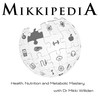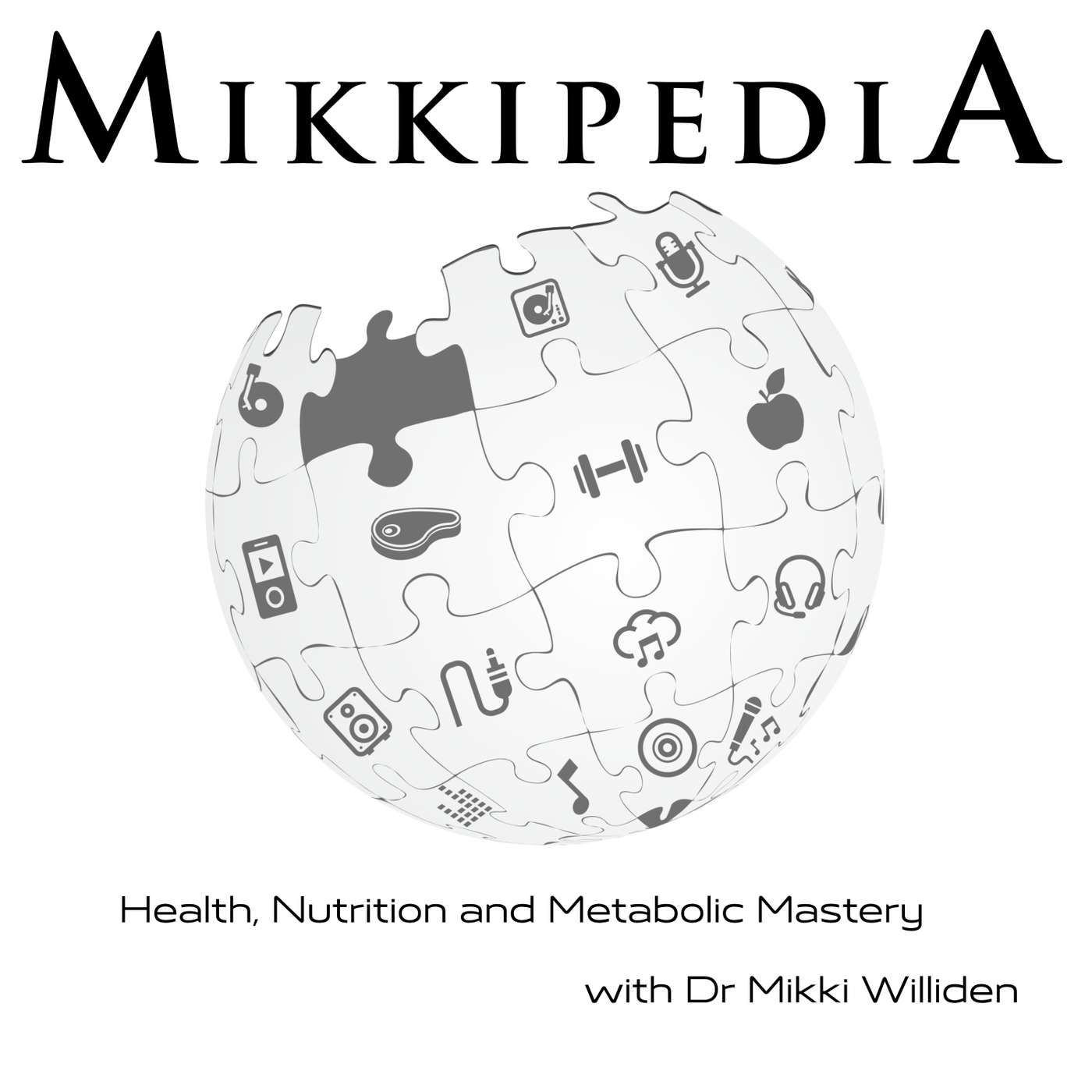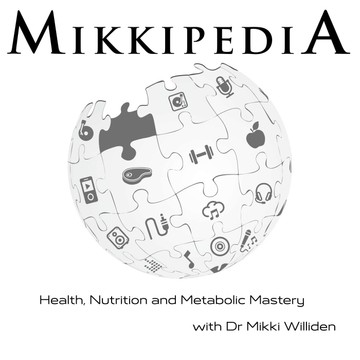

Mikkipedia
Mikki Williden
Mikkipedia is an exploration in all things health, well being, fitness, food and nutrition. I sit down with scientists, doctors, professors, practitioners and people who have a wealth of experience and have a conversation that takes a deep dive into their area of expertise. I love translating science into a language that people understand, so while some of the conversations will be pretty in-depth, you will come away with some practical tips that can be instigated into your everyday life. I hope you enjoy the show!
Episodes
Mentioned books

Aug 25, 2024 • 16min
Mini Mikkipedia - metabolic flexibility for women

Aug 20, 2024 • 1h 13min
Exercise, Sedentary Behaviour, and Cancer Risk: Insights with Dr. Terry Boyle
Save 20% on all Nuzest Products WORLDWIDE with the code MIKKIPEDIA at www.nuzest.co.nz, www.nuzest.com.au or www.nuzest.comThis week on the podcast Mikki speaks to epidemiologist Dr Terry Boyle about cancer risk and exercise. They discuss the increase in cancer cases worldwide and what might be at the heart of the increasing prevalence. They talk about how exercise can help reduce risk of cancer, but also how it can help an individual throughout their treatment and what the research tells us about its importance. They also discuss sedentary behaviour, what it means to be sedentary and why this increases the risk of cancer in the general population. And much more.https://people.unisa.edu.au/Terry.BoyleDr Terry Boyle is an epidemiologist in the Australian Centre for Precision Health at UniSA. He has a broad interest in lifestyle factors and chronic disease, with a focus on the role that physical activity and sedentary behaviour play in cancer risk, cancer survival and cancer survivorship. While he conducts research on a range of cancers, his recent studies have been on haematological cancers such as non-Hodgkin lymphoma.Terry received his PhD from The University of Western Australia in 2012, then received prestigious Fellowships from the Australian National Health and Medical Research Council (NHMRC) and the Canadian Institutes for Health Research (CIHR) which gave him the opportunity to spend two years at the BC Cancer Agency and the University of British Columbia in Vancouver, Canada. He joined UniSA in October 2017, before which he was at the Curtin University School of Public Health in Western Australia.Terry has experience in a range of epidemiological and biostatistical methods, including multiple imputation, meta-analysis, directed acyclic graphs, causal inference methods, assessment of lifestyle-related and occupational exposures and increasing participation in epidemiological studies, and is currently leading several projects involving pooling data from multiple national and international studies. Terry also lectures and consults in biostatistics.
Curranz Supplement: Use code MIKKIPEDIA to get 20% off your first order - go to www.curranz.co.nz or www.curranz.co.uk to order yours Contact Mikki:https://mikkiwilliden.com/https://www.facebook.com/mikkiwillidennutritionhttps://www.instagram.com/mikkiwilliden/https://linktr.ee/mikkiwilliden

Aug 18, 2024 • 28min
Mini mikkipedia - The therapeutic use of ketogenic diets

Aug 13, 2024 • 1h 23min
Metabolic Adaptation and Diet Dynamics with Dr. Eric Trexler
Save 20% on all Nuzest Products WORLDWIDE with the code MIKKIPEDIA at www.nuzest.co.nz, www.nuzest.com.au or www.nuzest.comCurranz Supplement: Use code MIKKIPEDIA to get 20% off your first order - go to www.curranz.co.nz or www.curranz.co.uk to order yours This week on the podcast Mikki speaks to one of the OGs in the strength, fitness, diet and science space, Dr Eric Trexler. Eric was one of the first on the internet (it seems) to really dive into metabolic adaptation and what that means for anyone who embarks on a calorie restricted diet. Mikki and Eric discuss how this differs to the constrained energy expenditure model, the interplay of diet and exercise in both of these and strategies to help overcome for better overall health and performance. They also discuss how his understanding of metabolism has evolved over time.Eric on Linked In https://www.linkedin.com/in/eric-trexler-19b8a9154/Iron Culture https://podcasts.apple.com/nz/podcast/iron-culture/id1452114380MASS Research Review https://massresearchreview.com/Eric on IG https://www.instagram.com/trexlerfitness/?hl=en Eric is cofounder of MASS research review and cohost on Iron Culture podcast. En route to an MA in Exercise and Sports Science and a PhD in Human Movement Science, he obtained extensive experience in research design, data collection, and advanced statistical analysis. To date, he has published 58 peer-reviewed papers pertaining to a wide range of health parameters in diverse participant populations.Since graduate school, he has pursued multiple entrepreneurial endeavours related to health, wellness, and technology. He is currently a postdoctoral researcher at Duke University where he studies health behaviour, health disparities, and the intersections between physical activity, nutrition, energy expenditure, and cardiometabolic health.
Contact Mikki:https://mikkiwilliden.com/https://www.facebook.com/mikkiwillidennutritionhttps://www.instagram.com/mikkiwilliden/https://linktr.ee/mikkiwilliden

Aug 11, 2024 • 25min
Mini Mikkipedia: Weight loss resistance - why have i stopped losing weight?

Aug 6, 2024 • 1h 5min
Melissa Urban's Insights: From Whole30 Evolution to the Power of Boundaries
Save 20% on all Nuzest Products WORLDWIDE with the code MIKKIPEDIA at www.nuzest.co.nz, www.nuzest.com.au or www.nuzest.comThis week on the podcast Mikki speaks to Whole30 founder Melissa Urban about the evolution of the Whole30 programme and the importance of, and how to set, boundaries. They discuss how science has emerged over the last 14 years that have led to the major rule changes in the programme (and what these are). In addition to this, Melissa also shares how she has changed and why this was so important to better understand an individual’s experience when embarking on the Whole30 programme. They also discuss Melissa’s Book of Boundaries, and how her work in Whole30 helping people navigate their Whole30 experience out in the world gave her insights in to the challenges that people have in standing up for themselves, communicating their needs in a way that makes them feel confident and empowered. This extends far beyond just food and they chat about the tools required to allow people to do this. And so much more. Melissa Urban sub stack https://substack.com/@melissauWhole30 program and book https://whole30.com/books/the-new-whole30-book/Book of Boundaries https://www.amazon.com/gp/product/0593448707?&_encoding=UTF8&tag=w30hmhb-20&linkCode=ur2&linkId=265f3b1a2ca72514194fdc0aaab69348&camp=1789&creative=9325%22%3EThe%20Book%20of%20Boundaries Melissa on IG https://www.instagram.com/melissau/MELISSA URBAN is the Whole30 (whole30.com) co-founder and CEO, and an authority on helping people change their relationship with food, set boundaries, and create life-long, healthy habits. After overcoming a five-year drug addiction in 2000, she adopted a growth mindset, dove into fitness, and began to study nutrition. In 2009, she self-designed a 30-day dietary experiment and saw unexpected and life-changing physical, mental, and emotional benefits. A few months later she blogged about the experiment and invited her readers to give it a try, calling the program "the Whole30."Fifteen years later and Whole30 is now a household name, featuring partnerships with Chipotle, Whole Foods, LaCroix, and Applegate, and eight Whole30 books. Melissa is a seven-time New York Times bestselling author (including the #1 best-seller The Whole30); has been featured by The Today Show, Good Morning America, the New York Times, the Wall Street Journal, Forbes, and CNBC; and ranks #13 on 2023's Top 100 Most Influential People in Wellness. Melissa has presented more than 150 health and nutrition seminars worldwide, and is a prominent keynote speaker on boundaries, building community, health trends, and entrepreneurship.
Curranz Supplement: Use code MIKKIPEDIA to get 20% off your first order - go to www.curranz.co.nz or www.curranz.co.uk to order yours Contact Mikki:https://mikkiwilliden.com/https://www.facebook.com/mikkiwillidennutritionhttps://www.instagram.com/mikkiwilliden/https://linktr.ee/mikkiwilliden

Aug 4, 2024 • 21min
Mini Mikkipedia - Does diet quality count when losing weight?

Jul 30, 2024 • 58min
Vanessa Spina - from ketogenic girl to optimizing protein
Save 20% on all Nuzest Products WORLDWIDE with the code MIKKIPEDIA at www.nuzest.co.nz, www.nuzest.com.au or www.nuzest.comCurranz Supplement: Use code MIKKIPEDIA to get 20% off your first order - go to www.curranz.co.nz or www.curranz.co.uk to order yours This week on the podcast Mikki speaks to Ketogenic Girl (and Optimal Protein podcast host) Vanessa Spina. They discuss how Vanessa the evolution of Vanessa’s dietary recommendations from the ketogenic diet to focusing on protein, what she has learned from 100s of episodes interviewing experts in the diet space, how becoming a mother has changed her own habits, and how she balances all aspects of her life and business. Vanessa Spina a Sport Nutrition Specialist (SNS) and the Best Selling author of Keto Essentials. She is an international speaker and the host of the popular Optimal Protein Podcast, which has over 400,000 downloads/month and has been nominated twice as a top 3 Best Podcast at the Metabolic Health Summit. Vanessa recently completed a two year Biomedical Science program at the University of Toronto to deepen her comprehension of biochemistry and physiology. Vanessa founded Ketogenic Girl in 2015 with online social media following of over half a million and several thousand people have done her popular KetogenicGirl Challenge program which serves to optimize metabolic health with nutrient dense real food nutrition. She has been featured as a nutrition expert in articles published in the Orlando Sentinel, Eat This, Parade, Reader’s Digest and more.Vanessa has recently created two innovative products, the Tone device which measures breath acetone, the ketone detected on the breath. She most recently the brand new Tone LUX red light therapy line and Tone protein powder.Can find Vanessa and her products here: https://ketogenicgirl.com/pages/about-ushttps://www.instagram.com/ketogenicgirl/?hl=en
Contact Mikki:https://mikkiwilliden.com/https://www.facebook.com/mikkiwillidennutritionhttps://www.instagram.com/mikkiwilliden/https://linktr.ee/mikkiwilliden

Jul 28, 2024 • 18min
Mini Mikkipedia - Time Restricted Eating: Reviewing the research
https://pubmed.ncbi.nlm.nih.gov/38639542/https://www.ncbi.nlm.nih.gov/pmc/articles/PMC10144293/
Contact Mikki:https://mikkiwilliden.com/https://www.facebook.com/mikkiwillidennutritionhttps://www.instagram.com/mikkiwilliden/https://linktr.ee/mikkiwillidenSave 20% on all Nuzest Products WORLDWIDE with the code MIKKI at www.nuzest.co.nz, www.nuzest.com.au or www.nuzest.comCurranz supplement: MIKKI saves you 25% at www.curranz.co.nz or www.curranz.co.uk off your first order

Jul 23, 2024 • 1h 5min
Bridging Research and Real-World Practice with Dr. Mike Ormsbee: Exercise, Nutrition, and Collagen Insights
Save 20% on all Nuzest Products WORLDWIDE with the code MIKKIPEDIA at www.nuzest.co.nz, www.nuzest.com.au or www.nuzest.comThis week on the podcast Mikki speaks to Dr Mike Ormsbee about integrating research and the real world, with many of his projects in the exercise physiology and nutrition space beginning in the ‘real world’ and then over time (as funding permits) being refined and more controlled. We talk about the value of having the initial research versus being in a very controlled setting. In the conversation there are some great take homes, specifically about pre sleep protein, the controversies of how useful collagen is, and his project on collagen for middle aged active people.Michael J. Ormsbee is a Professor and Graduate Program Director in the Department of Nutrition & Integrative Physiology, the Director of the Institute of Sports Sciences & Medicine at Florida State University, and an honorary research fellow at the University of KwaZulu-Natal in South Africa.He is also a Fellow of the American College of Sports Medicine, and the International Society of Sports Nutrition and is a Certified Strength & Conditioning Specialist through the National Strength & Conditioning Association. His research expertise involves the interaction of exercise training, nutrition, and supplementation to improve metabolism and achieve optimal body composition, human performance, and health in both athletic and clinical populations.Dr. Ormsbee was honored as the 2014 FSU Teacher of the Year, 2017 Nutrition Researcher of the Year (NSCA), 2018 FSU Graduate Student Mentor of the Year, 2020 FSU Distinguished Teacher of the Year, and the 2020 Sport Scientist of the Year (NSCA). His course, “Changing Body Composition Through Diet and Exercise” is available through The Great Courses, and his textbook, “Exercise Physiology for Health, Fitness, and Performance, 6th edition” is available online.IG/Twitter: @mikeormsbeeOnline course “Changing Body Composition through Diet and Exercise” (https://www.wondrium.com/changing-body-composition-through-diet-and-exercise)Textbook: 6th ed of Exercise Physiology for Health, Fitness, and Performance by Smith, Plowman, & Ormsbee (https://shop.lww.com/Exercise-Physiology-for-Health–Fitness–and-Performance/p/9781975179557)
Curranz Supplement: Use code MIKKIPEDIA to get 20% off your first order - go to www.curranz.co.nz or www.curranz.co.uk to order yours Contact Mikki:https://mikkiwilliden.com/https://www.facebook.com/mikkiwillidennutritionhttps://www.instagram.com/mikkiwilliden/https://linktr.ee/mikkiwilliden


